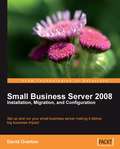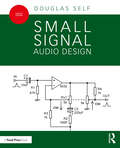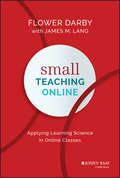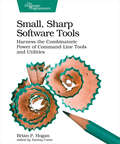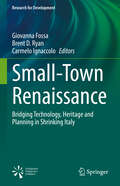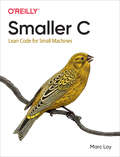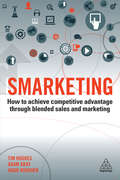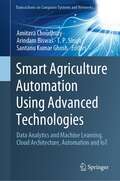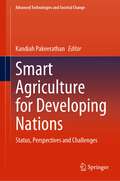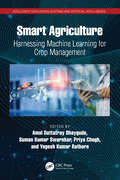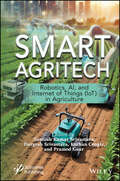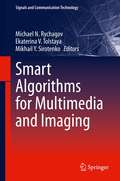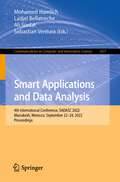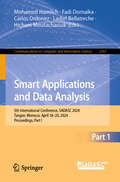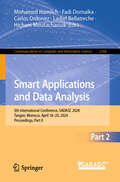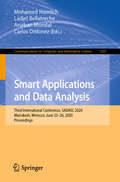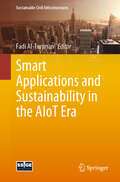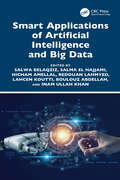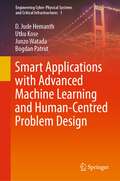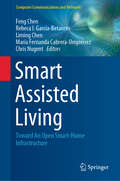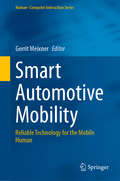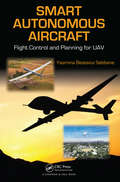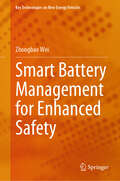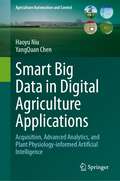- Table View
- List View
Small Business Server 2008 – Installation, Migration, and Configuration
by David OvertonThis book presents step-by-step guidance through the installation and configuration process with the help of numerous screenshots. It contains many snippets of information and guidance on decision making. As every eventuality can't be covered, there are links to online information as well as pointers to forums the author personally interacts with to answer additional questions. This book is designed for anyone who needs to install and configure SBS 2008. You don't need to be a technical consultant who wants to tweak every setting to become an SBS success. This book will help those with a basic understanding of technology and a desire to install and use SBS 2008 quickly and continue with their business.
Small Signal Audio Design
by Douglas SelfSmall Signal Audio Design is a highly practical handbook providing an extensive repertoire of circuits that can be assembled to make almost any type of audio system. This fully revised fourth edition offers wholly new content on internally balanced audio design, electret microphones, emitter-follower stability, microphony in capacitors, and much, much more. This book continues the engaging prose style familiar to readers as you learn why mercury-filled cables are not a good idea, the pitfalls of plating gold on copper, and what quotes from Star Trek have to do with PCB design. Learn how to: make amplifiers with apparently impossibly low noise design discrete circuitry that can handle enormous signals with vanishingly low distortion transform the performance of low-cost opamps build active filters with very low noise and distortion while saving money on expensive capacitors make incredibly accurate volume controls make a huge variety of audio equalisers use load synthesis to make magnetic cartridge preamplifiers that have noise so low it is limited by basic physics sum, switch, clip, compress, and route audio signals build simple but ultra-low noise power supplies be confident that phase perception is not an issue. Including all the crucial theories, but with minimal mathematics, Small Signal Audio Design is the must-have companion for anyone studying, researching, or working in audio engineering and audio electronics.
Small Summaries for Big Data
by Graham Cormode Ke YiThe massive volume of data generated in modern applications can overwhelm our ability to conveniently transmit, store, and index it. For many scenarios, building a compact summary of a dataset that is vastly smaller enables flexibility and efficiency in a range of queries over the data, in exchange for some approximation. This comprehensive introduction to data summarization, aimed at practitioners and students, showcases the algorithms, their behavior, and the mathematical underpinnings of their operation. The coverage starts with simple sums and approximate counts, building to more advanced probabilistic structures such as the Bloom Filter, distinct value summaries, sketches, and quantile summaries. Summaries are described for specific types of data, such as geometric data, graphs, and vectors and matrices. The authors offer detailed descriptions of and pseudocode for key algorithms that have been incorporated in systems from companies such as Google, Apple, Microsoft, Netflix and Twitter.
Small Teaching Online: Applying Learning Science in Online Classes
by James M. Lang Flower DarbyFind out how to apply learning science in online classes The concept of small teaching is simple: small and strategic changes have enormous power to improve student learning. Instructors face unique and specific challenges when teaching an online course. This book offers small teaching strategies that will positively impact the online classroom. This book outlines practical and feasible applications of theoretical principles to help your online students learn. It includes current best practices around educational technologies, strategies to build community and collaboration, and minor changes you can make in your online teaching practice, small but impactful adjustments that result in significant learning gains. • Explains how you can support your online students • Helps your students find success in this non-traditional learning environment • Covers online and blended learning • Addresses specific challenges that online instructors face in higher education Small Teaching Online presents research-based teaching techniques from an online instructional design expert and the bestselling author of Small Teaching.
Small, Sharp Software Tools: Harness the Combinatoric Power of Command-Line Tools and Utilities
by Brian P. HoganThe command-line interface is making a comeback. That's because developers know that all the best features of your operating system are hidden behind a user interface designed to help average people use the computer. But you're not the average user, and the CLI is the most efficient way to get work done fast. Turn tedious chores into quick tasks: read and write files, manage complex directory hierarchies, perform network diagnostics, download files, work with APIs, and combine individual programs to create your own workflows. Put down that mouse, open the CLI, and take control of your software development environment. No matter what language or platform you're using, you can use the CLI to create projects, run servers, and manage files. You can even create new tools that fit right in with grep, sed, awk, and xargs. You'll work with the Bash shell and the most common command-line utilities available on macOS, Windows 10, and many flavors of Linux.Create files without opening a text editor. Manage complex directory strutures and move around your entire file system without touching the mouse. Diagnose network issues and interact with APIs. Chain several commands together to transform data, and create your own scripts to automate repetitive tasks. Make things even faster by customizing your environment, creating shortcuts, and integrating other tools into your environment. Hands-on activities and exercises will cement your newfound knowledge and give you the confidence to use the CLI to its fullest potential. And if you're worried you'll wreck your system, this book walks you through creating an Ubuntu virtual machine so you can practice worry-free.Dive into the CLI and join the thousands of other devs who use it every day.What You Need:You'll need macOS, Windows 10, or a Linux distribution like Ubuntu, Fedora, CentOS, or Debian using the Bash shell.
Small-Town Renaissance: Bridging Technology, Heritage and Planning in Shrinking Italy (Research for Development)
by Brent D. Ryan Giovanna Fossa Carmelo IgnaccoloCan digital innovation revitalize rural communities and preserve cultural heritage at the same time? This book dives into the transformative power of digitization in rural regions—where technology isn&’t just a tool, but a lifeline for local culture, economic resilience, and future development. Born from a unique research collaboration between the Massachusetts Institute of Technology and Politecnico di Milano, supported by the Roberto Rocca Foundation and MIT Italy, this book brings together cutting-edge data-driven scholarly work on shrinking towns, economic development, and digital innovation. Together with local authorities, small business owners, and community leaders in Sicily and Lombardy, the project tackled some of the most pressing challenges facing rural Italy—from population decline to economic stagnation—all through the lens of digital transformation. But this story isn&’t just about Italy. Similar struggles play out in rural communities across Japan, Korea, Spain, the United States, Germany, and beyond. Amid the global acceleration of digital technologies sparked by the COVID-19 pandemic, this volume offers a bold roadmap for blending innovation with tradition, proposing smart platforms to amplify local voices, promote heritage-based economies, and design collaborative workspaces that anchor rural resilience. Whether you&’re a policymaker, urban planner, designer, tech innovator, or heritage advocate, this book offers fresh insights, actionable strategies, and a compelling vision for the future of rural development in the digital age.
Smaller C
by Marc LoyFor makers looking to use the smallest microcontrollers or to wring the highest performance out of larger ones, the C language is still the best option. This practical book provides a solid grounding in C basics for anyone who tinkers with programming microcontrollers. You'll explore the many ways C enables developers and makers to get big results out of tiny devices.Author Marc Loy shows you how to write clean, maintainable C code from scratch. This language and its cousin, C++, are still widely used to write low-level code for device drivers or operating systems. By understanding C syntax and its quirks, you'll gain an enduring computer language literacy that will help you pick up new languages and styles more easily.Learn C fundamentals, such as data types, flow control, and functionsExplore memory management including how programs work on small devicesUnderstand answers provided in online forums such as Reddit or Stack OverflowWrite efficient, custom C code that's both readable and maintainableAnalyze the performance of your code and weigh optimizationsEvaluate third-party libraries for use in your own projectsCreate your own libraries to share with others
Smarketing: How to Achieve Competitive Advantage through Blended Sales and Marketing
by Tim Hughes Adam Gray Hugo WhicherSince the earliest days of 'modern' marketing and sales, the departments that ran these key functions have been separate empires. They have different leaders, different budgets, and different organizational structures. However, with the overwhelming impact of continuous disruption, many organizations have been left floundering, unsure of how to get traction in the market. The old rule book has been torn up and thrown away.Smarketing is the first book that explores the shift that will become the future state operating model for companies seeking to remain competitive and relevant in this fast-changing digital world. It explains how and why companies should blend sales and marketing into one single, streamlined smarketing department. Sales people will become better marketers, and marketers better sales people, leading to bigger, better business growth all round.With clearly defined implementation strategies that can be applied by any company, regardless of size or sector, Smarketing is an invaluable resource for any marketing or sales professional looking to drive growth and success in the new era of marketing.
Smart Agriculture Automation Using Advanced Technologies: Data Analytics and Machine Learning, Cloud Architecture, Automation and IoT (Transactions on Computer Systems and Networks)
by Arindam Biswas T. P. Singh Amitava Choudhury Santanu Kumar GhoshThis book addresses the challenges for developing and emerging trends in Internet-of-Things (IoT) for smart agriculture platforms. It also describes data analytics & machine learning, cloud architecture, automation & robotics and aims to overcome existing barriers for smart agriculture with commercial viability. It discusses IoT-based monitoring systems for analyzing the crop environment, and methods for improving the efficiency of decision-making based on the analysis of harvest statistics. The book explores a range of applications including intelligent field monitoring, intelligent data processing and sensor technologies, predictive analysis systems, crop monitoring, and weather data-enabled analysis in IoT agro-systems. This volume will be helpful for engineering and technology experts and researchers, as well as for policy-makers.
Smart Agriculture for Developing Nations: Status, Perspectives and Challenges (Advanced Technologies and Societal Change)
by Kandiah PakeerathanThis book in its eighteen chapters provides sustainable and smart technology-based solutions to developing nations. Smart farming is growing in importance due to the increasing demand for higher crop yield, the need for using natural resources efficiently, the rising use and sophistication of information and communication technology and the increasing need for climate-smart agriculture. Some of these chapters deal with the applications of smart agriculture to address the special challenges of the Small Island Developing States for sustainable agriculture. The book brings together scientific communities from India, Indonesia, Iraq, Malaysia, Mauritius, Myanmar, Palestine, Sri Lanka and South Africa to share their expertise to make the farming system more connected and intelligent. The smart farming techniques shared in different chapters not only help to reduce the overall cost and improve the quality and quantity of products but altogether help improve the sustainability of agriculture in the developing world.‘Smart Farming’ is a management concept focused on providing the agricultural industry with the infrastructure to leverage advanced technologies—including artificial intelligence (AI), big data, robotics, drones and Internet of Things (IoT)—for tracking, monitoring, automating and analyzing operations. Sometimes known as precision agriculture, smart farming is software managed and sensor monitored.
Smart Agriculture: Harnessing Machine Learning for Crop Management (Intelligent Data-Driven Systems and Artificial Intelligence)
by Suman Kumar Swarnkar Yogesh Kumar Rathore Amol Dattatray Dhaygude Priya ChughThis book, Smart Agriculture: Harnessing Machine Learning for Crop Management, is a comprehensive guide designed to explore the various facets of integrating machine learning into agricultural practices. It aims to provide readers with a solid foundation in machine learning concepts while demonstrating their practical applications in real-world farming scenarios. It also examines the role of remote monitoring and precision agriculture, highlighting how technologies such as remote sensing and recurrent neural networks can optimize farming practices.This book:· Emphasizes sustainable agricultural practices and data-driven decision-making for eco-friendly farming. · Highlights the importance of using environmentally friendly practices, and how machine learning can play a pivotal role in achieving sustainability goals. · Discusses topics such as crop optimization, disease detection, pest control, resource management, precision agriculture, and sustainability. · Covers predictive analytics for weather forecasting, Internet of Things applications for precision agriculture, and the role of sensors in data collection. · Illustrates optimizing resource allocation, irrigation with artificial intelligence, and machine learning for soil health assessment. Whether you are a researcher, a student, an agricultural professional, or a technology enthusiast, this book offers valuable insights into the transformative power of machine learning in agriculture. It invites readers to explore the potential of machine learning to transform farming practices, improve food security, and promote environmental sustainability.
Smart Agritech: Robotics, AI, and Internet of Things (IoT) in Agriculture
by Korhan Cengiz Durgesh Srivastava Santosh Kumar Srivastava Pramod GaurThe main goal of Smart Agritech: Robotics, AI, and Internet of Things (IoT) in Agriculture is to explore how emerging technologies such as robotics, artificial intelligence (AI), and IoT can be leveraged to improve efficiency, sustainability, and productivity in agriculture. Agriculture has always been a vital sector of the global economy, providing food and raw materials for industries and households. However, with the growing population, changing climate conditions, and limited resources, the agriculture sector faces numerous challenges. To address these challenges, farmers and agricultural companies are turning to advanced technologies such as Robotics, Artificial Intelligence (AI), and the Internet of Things (IoT). This exciting new volume provides a comprehensive overview of the latest technological advances in agriculture, focusing on these three cutting-edge technologies. The book will explore the potential benefits of these technologies in improving agricultural efficiency, productivity, and sustainability. Whether for the veteran engineer, scientist in the lab, student, or faculty, this groundbreaking new volume is a valuable resource for researchers and other industry professionals interested in the intersection of technology and agriculture.
Smart Algorithms for Multimedia and Imaging (Signals and Communication Technology)
by Michael N. Rychagov Ekaterina V. Tolstaya Mikhail Y. SirotenkoThis book presents prospective, industrially proven methods and software solutions for storing, processing, and viewing multimedia content on digital cameras, camcorders, TV, and mobile devices. Most of the algorithms described here are implemented as systems on chip firmware or as software products and have low computational complexity and memory consumption. In the four parts of the book, which contains a total of 16 chapters, the authors address solutions for the conversion of images and videos by super-resolution, depth estimation and control and mono-to-stereo (2D to 3D) conversion; display applications by video editing; the real-time detection of sport episodes; and the generation and reproduction of natural effects. The practical principles of machine learning are illustrated using technologies such as image classification as a service, mobile user profiling, and automatic view planning with dictionary-based compressed sensing in magnetic resonance imaging. The implementation of these technologies in mobile devices is discussed in relation to algorithms using a depth camera based on a colour-coded aperture, the animated graphical abstract of an image, a motion photo, and approaches and methods for iris recognition on mobile platforms. The book reflects the authors’ practical experience in the development of algorithms for industrial R&D and the commercialization of technologies.Explains digital techniques for digital cameras, camcorders, TV, mobile devices;Offers essential algorithms for the processing pipeline in multimedia devices and accompanying software tools;Features advanced topics on data processing, addressing current technology challenges.
Smart Applications and Data Analysis: 4th International Conference, SADASC 2022, Marrakesh, Morocco, September 22–24, 2022, Proceedings (Communications in Computer and Information Science #1677)
by Ladjel Bellatreche Mohamed Hamlich Sebastian Ventura Ali SiadatThis book constitutes the refereed proceedings of the 4th International Conference onSmart Applications and Data Analysis, SADASC 2022, held in Marrakesh, Morocco,during September 22–24, 2022.The 24 full papers and 11 short papers included in this book were carefully reviewed andselected from 64 submissions. They were organized in topical sections as follows: AI-Driven Methods 1; Networking technologies & IoT; AI-Driven Methods 2; Green Energy, Computing and Technologies 1; AI-Driven Methods 3; Green Energy, Computing and Technologies 2; Case studies and Cyber-Physical Systems 1; Case studies and Cyber-Physical Systems 2; and Case studies and Cyber-Physical Systems 3.
Smart Applications and Data Analysis: 5th International Conference, SADASC 2024, Tangier, Morocco, April 18–20, 2024, Proceedings, Part I (Communications in Computer and Information Science #2167)
by Ladjel Bellatreche Carlos Ordonez Mohamed Hamlich Fadi Dornaika Hicham MoutachaouikThis two-volume set CCIS 2167-2168 constitutes the proceedings of the 5th International Conference on Smart Applications and Data Analysis, SADASC 2024, held in Tangier, Morocco, in April 2024. The 30 full papers presented together with 10 short papers were carefully reviewed and selected from 91 submissions. They cover the following topics: designing and modeling; data management; tinyML and anomaly detection; network technologies and IOT; control, dynamic systems and optimisation; and exploitation and exploration.
Smart Applications and Data Analysis: 5th International Conference, SADASC 2024, Tangier, Morocco, April 18–20, 2024, Proceedings, Part II (Communications in Computer and Information Science #2168)
by Ladjel Bellatreche Carlos Ordonez Mohamed Hamlich Fadi Dornaika Hicham MoutachaouikThis two-volume set CCIS 2167-2168 constitutes the proceedings of the 5th International Conference on Smart Applications and Data Analysis, SADASC 2024, held in Tangier, Morocco, in April 2024. The 30 full papers presented together with 10 short papers were carefully reviewed and selected from 91 submissions. They cover the following topics: designing and modeling; data management; tinyML and anomaly detection; network technologies and IOT; control, dynamic systems and optimisation; and exploitation and exploration.
Smart Applications and Data Analysis: Third International Conference, SADASC 2020, Marrakesh, Morocco, June 25–26, 2020, Proceedings (Communications in Computer and Information Science #1207)
by Ladjel Bellatreche Carlos Ordonez Anirban Mondal Mohamed HamlichThis volume constitutes refereed proceedings of the Third International Conference on Smart Applications and Data Analysis, SADASC 2020, held in Marrakesh, Morocco. Due to the COVID-19 pandemic the conference has been postponed to June 2020. The 24 full papers and 3 short papers presented were thoroughly reviewed and selected from 44 submissions. The papers are organized according to the following topics: ontologies and meta modeling; cyber physical systems and block-chains; recommender systems; machine learning based applications; combinatorial optimization; simulations and deep learning.
Smart Applications and Sustainability in the AIoT Era (Sustainable Civil Infrastructures)
by Fadi Al-TurjmanThis book gathers recent research work on emerging Artificial Intelligence (AI) methods for processing and storing data generated by smart infrastructures. Smart infrastructures gather Terabytes of data nowadays with no need for traditional control. The data automatically uploads to the cloud computing platform. The cloud analyses the data and generates the required output in visualization, graph, and action. A remote access network can be constructed dependent on either low-elevation or high-altitude stages. When associated with satellite and earthly frameworks, these stages empower a far-reaching access network with worldwide inclusion and diverse administration provisioning. Data analytics are used in agriculture, mining, waste management, energy, and military defenses. Major topics covered include the analysis and development of AI-powered mechanisms in future IoT and smart infrastructures applications. Further, the book addresses new technological developments, current research trends, and industry needs. Presenting case studies, experience and evaluation reports, and best practices in utilizing AI applications in IoT networks, it strikes a good balance between theoretical and practical issues. It also provides technical/scientific information on various aspects of AI technologies, ranging from basic concepts to research grade material, including future directions. The book is intended for researchers, practitioners, engineers and scientists involved in the design and development of protocols and AI applications for smart and sustainable infrastructure-related devices.
Smart Applications of Artificial Intelligence and Big Data (Advances in Digital Technologies for Smart Applications)
by Inam Ullah Khan Salma El Hajjami Salwa Belaqziz Hicham Amellal Redouan Lahmyed Lahcen Koutti Boulouz AbdellahSmart Applications of Artificial Intelligence and Big Data covers a wide range of topics related to AI and big data, including machine learning, deep learning, natural language processing, computer vision, data analytics, and data mining. It focuses on the integration of these technologies to create smart applications, such as intelligent transportation systems, smart healthcare, smart cities, and smart grids.This book comprises 21 chapters, each providing technical details pertaining to research, practical examples, and case studies to help readers understand the real-world applications of AI and big data technologies. The book also highlights cutting-edge research on AI and big data, including novel algorithms, tools, and techniques. It discusses the challenges and opportunities of using AI and big data to develop smart applications and provides recommendations for the development of responsible and transparent AI-based systems. This book is a valuable resource for researchers and professionals looking to stay up-to-date with the latest advancements in AI and big data and how they can be applied to solve real-world challenges.
Smart Applications with Advanced Machine Learning and Human-Centred Problem Design (Engineering Cyber-Physical Systems and Critical Infrastructures #1)
by Junzo Watada D. Jude Hemanth Bogdan Patrut Utku KoseThis book brings together the most recent, quality research papers accepted and presented in the 3rd International Conference on Artificial Intelligence and Applied Mathematics in Engineering (ICAIAME 2021) held in Antalya, Turkey between 1-3 October 2021. Objective of the content is to provide important and innovative research for developments-improvements within different engineering fields, which are highly interested in using artificial intelligence and applied mathematics. As a collection of the outputs from the ICAIAME 2021, the book is specifically considering research outcomes including advanced use of machine learning and careful problem designs on human-centred aspects. In this context, it aims to provide recent applications for real-world improvements making life easier and more sustainable for especially humans. The book targets the researchers, degree students, and practitioners from both academia and the industry.
Smart Assisted Living: Toward An Open Smart-Home Infrastructure (Computer Communications and Networks)
by Feng Chen Liming Chen Rebeca I. García-Betances María Fernanda Cabrera-Umpiérrez Chris NugentSmart Homes (SH) offer a promising approach to assisted living for the ageing population. Yet the main obstacle to the rapid development and deployment of Smart Home (SH) solutions essentially arises from the nature of the SH field, which is multidisciplinary and involves diverse applications and various stakeholders. Accordingly, an alternative to a one-size-fits-all approach is needed in order to advance the state of the art towards an open SH infrastructure.This book makes a valuable and critical contribution to smart assisted living research through the development of new effective, integrated, and interoperable SH solutions. It focuses on four underlying aspects: (1) Sensing and Monitoring Technologies; (2) Context Interference and Behaviour Analysis; (3) Personalisation and Adaptive Interaction, and (4) Open Smart Home and Service Infrastructures, demonstrating how fundamental theories, models and algorithms can be exploited to solve real-world problems.This comprehensive and timely book offers a unique and essential reference guide for policymakers, funding bodies, researchers, technology developers and managers, end users, carers, clinicians, healthcare service providers, educators and students, helping them adopt and implement smart assisted living systems.
Smart Automotive Mobility: Reliable Technology for the Mobile Human (Human–Computer Interaction Series)
by Gerrit MeixnerThis book focuses on smart results in the field of smart automotive mobility concentrating on (semi-)autonomous cars. The results are based on 5 recently finished public-funded research projects with a budget of over 15 million Euro. Providing insights into the next generation of personalized mobility on the road the authors discuss personalized, adaptive cooperative systems for highly automated cars and how they can be developed in a human-centered way. Furthermore, the book reports on a cooperative driver-vehicle interaction. How can the driver and the vehicle support each other? What are their best skills and how can they benefit from each other? It also gives novel insights on intuitive steering gestures on the steering wheel which initiate maneuvers to be executed by the automation, and to be supervised by, influenced or interrupted by the driver. The book finishes with information on a cooperative laser beam system which improves the communication between the different road participants to optimize the road safety of tomorrow. Smart Automotive Mobility: Reliable Technology for the Mobile Human is an ideal source for researchers, students and practitioners working in the area of intelligent systems for the automotive industry. It gives valuable and condensed information from multi-million Euro research projects funded by the German Federal Ministry of Education and Research.
Smart Autonomous Aircraft: Flight Control and Planning for UAV
by Yasmina Bestaoui SebbaneWith the extraordinary growth of Unmanned Aerial Vehicles (UAV) in research, military, and commercial contexts, there has been a need for a reference that provides a comprehensive look at the latest research in the area. Filling this void, Smart Autonomous Aircraft: Flight Control and Planning for UAV introduces the advanced methods of flight contr
Smart Battery Management for Enhanced Safety (Key Technologies on New Energy Vehicles)
by Zhongbao WeiThis book consolidates studies in the rapidly and foreseeably growing field of battery management. The primary focus is to overview the management of batteries (Li-ion batteries and some cases of flow batteries) with the fusion of mechanism and AI-based approaches. The book can be categorized into three groups, i.e., (i) mechanism and AI-based battery modeling and parameterization, (ii) AI-based diagnostic, early warning, and active safety control, and (iii) emerging techniques of smart battery and smart management, combining the emerging areas of embedded sensing and reconfigurable batteries. It is well recognized that the battery safety and management are the kernel of energy storage, renewable utilization, and low-carbon society, which have been highly popular in recent years. The exploration of AI techniques for advanced battery management has been seldom discussed systematically before. Moreover, the combination of AI and mechanism approaches can remarkably enhance the battery management, which however has never been focused on in previous books. Therefore, this book can add new knowledge to the paradigm and attract the attention of academics, scientists, engineers, and practitioners. It is a reference book for researchers and engineers in related fields. The step-by-step guidance, comprehensive introduction, and case studies make it accessible to audiences of different levels, from graduates to experienced engineers.
Smart Big Data in Digital Agriculture Applications: Acquisition, Advanced Analytics, and Plant Physiology-informed Artificial Intelligence (Agriculture Automation and Control)
by YangQuan Chen Haoyu NiuIn the dynamic realm of digital agriculture, the integration of big data acquisition platforms has sparked both curiosity and enthusiasm among researchers and agricultural practitioners. This book embarks on a journey to explore the intersection of artificial intelligence and agriculture, focusing on small-unmanned aerial vehicles (UAVs), unmanned ground vehicles (UGVs), edge-AI sensors and the profound impact they have on digital agriculture, particularly in the context of heterogeneous crops, such as walnuts, pomegranates, cotton, etc. For example, lightweight sensors mounted on UAVs, including multispectral and thermal infrared cameras, serve as invaluable tools for capturing high-resolution images. Their enhanced temporal and spatial resolutions, coupled with cost effectiveness and near-real-time data acquisition, position UAVs as an optimal platform for mapping and monitoring crop variability in vast expanses. This combination of data acquisition platforms and advanced analytics generates substantial datasets, necessitating a deep understanding of fractional-order thinking, which is imperative due to the inherent “complexity” and consequent variability within the agricultural process. Much optimism is vested in the field of artificial intelligence, such as machine learning (ML) and computer vision (CV), where the efficient utilization of big data to make it “smart” is of paramount importance in agricultural research. Central to this learning process lies the intricate relationship between plant physiology and optimization methods. The key to the learning process is the plant physiology and optimization method. Crafting an efficient optimization method raises three pivotal questions: 1.) What represents the best approach to optimization? 2.) How can we achieve a more optimal optimization? 3.) Is it possible to demand “more optimal machine learning,” exemplified by deep learning, while minimizing the need for extensive labeled data for digital agriculture? This book details the foundations of the plant physiology-informed machine learning (PPIML) and the principle of tail matching (POTM) framework. It is the 9th title of the "Agriculture Automation and Control" book series published by Springer.
